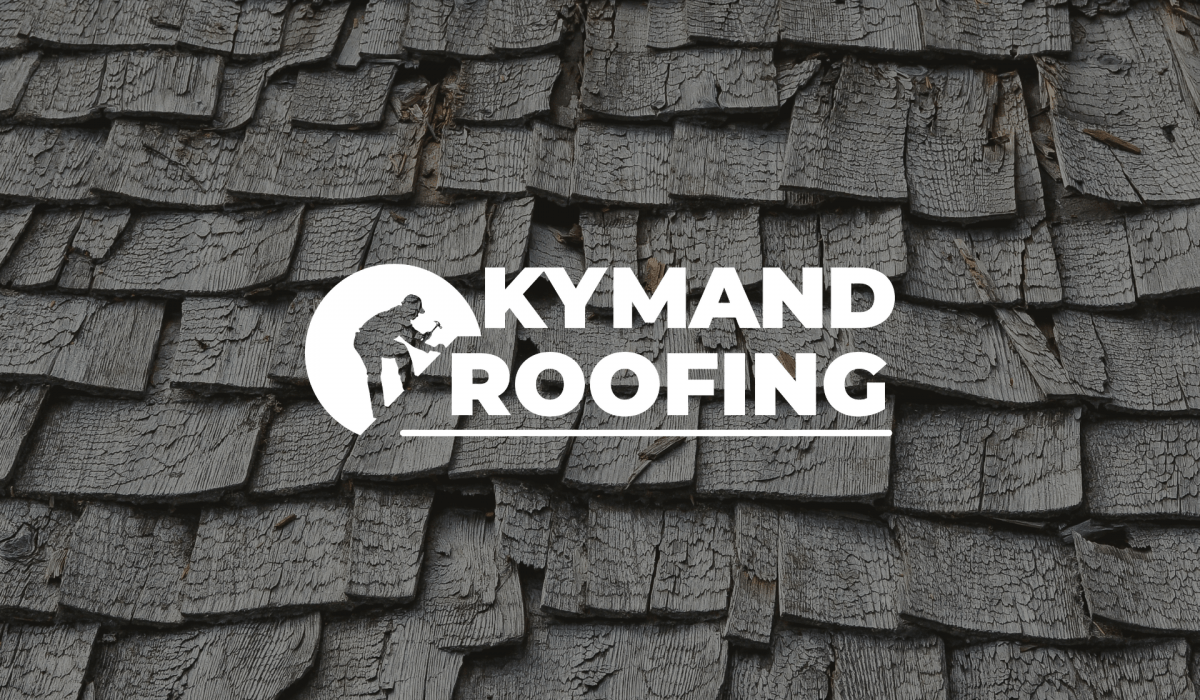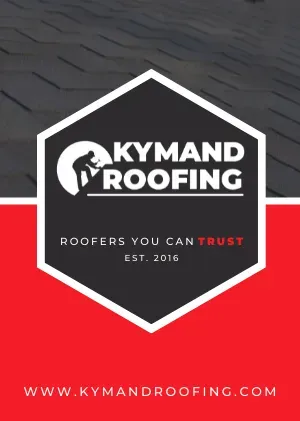How Long Does a Roof Last?
Kymand Roofing Inc. - Blog - Roofing

By Kymand Roofing Inc.
Roofing
0 Comment
Have you ever asked yourself, how long will my roof last? The lifespan of a roof is one of those details that slip many homeowners minds and can be a surprising bill when it comes time to repair or replace the roof. In most people’s minds, as long as the roof hasn’t suffered any visible damage and not leaking, it’s likely fine.
In reality, learning how to gauge the condition of the roof can help you avoid a lot of problems in the future. To learn how to gauge the roof’s condition you need to know a few things about the materials used to construct the roof, how long it’s supposed to last, and what factors influence its lifespan.
How long does a roof last?
The lifespan of a roof strongly depends on which material it’s been made with and what conditions it’s been kept in.
There are 5 major types of roofs, that tend to be the most popular when it comes to residential housing:
1) Clay tile roofs
2) Slate tile roofs
3) Asphalt shingles
4) Wood shakes shingles
5) Metal roofing
These aren’t the only ones, but they are the most commonly used in Canada, and any house you’re buying is very likely to have a roof that fits within one of these categories.
So how long does a roof from these categories last? Are there any major differences? Certain materials can withstand more than others, so the environment, materials, craftsmanship, and upkeep will all play a rather large role when it comes to your roof, but on average you can expect a well-maintained roof to last around 30 years.
Factors On How Long A Roof Will Last
Let’s break down what you need to pay attention to when installing a new roof or examining an old one:
- The Type of Materials the Roof Is Made of – Each of the 5 Materials Described Above Have Different Durability and Lifespan. Depending on the Materials You Choose, You’re Setting Up the Roof to Last for a Certain Amount of Years.
- The Quality of Materials the Roof Is Made of – Similarly, the Durability of the Materials the Roof Is Made of Depends on Their Quality. While Certain Materials May Last Longer Than Others on Average, Their Quality May Easily Change the Scales (I.e. Roof Made of Materials That Should Last Less May, in Fact, Last Longer Than Materials Perceived to Be More Durable Due to Higher Quality);
- Craftsmanship – the Quality of Workmanship During Installation Matters No Less Than the Quality of Materials Themselves. A Poor Contractor Doing a Bad Installation Job Will Result in a Roof That Will Disintegrate Far Quicker Than the Type and Quality of Materials Would Indicate.
- Environment – Last, but Certainly Not Least, a Violent Environment Will Decrease the Lifespan of Your Roof Faster. If You Live in an Area Prone to Extreme Temperatures or High Winds, You Should Pay Extra Attention to Your Roof Upkeep, as All the Exposure Will Hasten Its Deterioration.
The Life Span Of Materials Used
While all 4 of the abovementioned factors play a large role in determining the prospective lifespan of your roof, if we were to choose just one decisive factor – it would be the materials the roof is made out of.
Knowing in which of the 5 major types your roof falls in, gives you trustworthy approximate stats to fall back on when planning what to do next with your roof, including if the the roof should be replaced or repaired.
Let’s break it all down!
1. Clay Tile Roofs
Clay tiles are some of the most durable long-lasting roof materials. A clay tile roof can last anywhere between 50 and 100 years.
This long lifespan is due to their durability and nigh-invulnerability to environmental conditions. A clay tile roof can withstand most extreme weather conditions very well, with strong winds and precipitation doing little damage compared to other materials. They are also fire resistant!
One weakness clay tile roofs have is their vulnerability towards extreme cold, as constant change between freezing and thawing can crack it, and moisture accumulation can precipitate moss growth.
Still, this only means their lifespan will be closer to 50 years than to 100, and you can significantly prolong a clay roof lifespan if you have it regularly cleaned and checked for moss, algae, and mold.
Clay tile roofs aren’t the most affordable option out there, but they’re a good investment – and they come with warranties that can last from 30 years to a lifetime.
2. Slate Tile Roofs
If you’re buying or building a forever home and willing to pay for what is essentially a lifetime investment – then slate tile roofs are the way to go.
First of all, slate tiles have the longest lifespan out of all materials on this list. A slate tile roof can easily last at least 75 years, and up to 200 years, if the environment is favorable and it’s well-maintained. They don’t require a lot of maintenance to begin with, as moisture accumulation on slate tile roofs is almost nonexistent.
Another upside of slate tiles is their high resistance to extreme weather conditions in both high and low temperatures, strong winds, and heavy precipitation.
Slate tile roofs have two downsides.
First, the price – they’re possibly the priciest option you’ll encounter while exploring your options. They do however come with warranties that last 50 years to a lifetime, which is a big plus.
Second, the weight. 100 ft² of slate tile roofing can easily weigh 1,000 pounds. Not all residential homes can withstand this weight so you’ll need to have your roofing structure inspected by a contractor.
3. Asphalt Shingles
Asphalt shingles are not made of strictly asphalt alone – they’re a mix of fiberglass and asphalt sealant, a durable material that can reliably protect your home from winds, UV lights, rain, and snow.
This type of roof is the most common in Canada as they’re relatively cheaper and come with warranties up to 30 years.
However, the longevity of asphalt shingle roofs varies wildly. They’re vulnerable to extreme temperatures, particularly heat, which can shorten the lifespans in warmer climates. Also, the asphalt shingles themselves come in different types, which can fall anywhere between 15 and 40 years due to combinations of factors:
- 3-tab Asphalt Shingles – The Most Affordable Option – Typically Last Around 15-20 Years;
- Architectural Shingles, Which Are Considered to Be a Mid-tier Option (but Come at a Much Heftier Price Compared to 3-tabs) Last, on Average, Around 20-30 Years;
- Premium Shingles – The Priciest of the Bunch – Cost a Lot, but Last Between 30 and 40 Years, So Might Be Worth the Investment if You’re Buying a Forever Home.
4. Wood Shakes and Shingles
Wood shingles last on average 30 years and can last even longer – but demand considerably more attention than other roof types.
For a wood shingle to last a long-time, you need to clean it annually, repaint or stain it every 5 years, and look out for rot and insect damage.
This can be mitigated by choosing more long-lasting materials, like cedar, but it’ll also cost you more. Luckily, wood shingles also come with warranties that run for up to 30 years.
A significant upside of wooden shakes and shingles is their resistance to high-speed winds (up to 245 miles/hour), which makes them uniquely suited for certain environments – like the coast.
5. Metal Roofing
Metal roofing is probably the hardest of the bunch to pinpoint as its lifespan is heavily dependent upon not only the type of metal used and the surrounding environment, but the design of the roof as well.
It is however, generally the most long-lasting option with an average lifespan of anywhere between 40 and 70 years. As with asphalt shingles, there are sub-types for metal roofing, and which sub-type you settle on will determine both the price and longevity of your roof:
- Ribbed Metal Panels Are the Cheapest Option, and, Accordingly Last the Shortest – Between 25 and 50 Years on Average;
- Stand Seem Is the Most Common Type of Metal Roofing You’ll Encounter in Canada. It Lasts Around 50 Years on Average, and Depending on the Type of Metal Used, May Last Much Longer!
- Stone-coated Steel Tiles Aren’t Very Popular Overall, but They’re Common in Areas With Extreme Weather Conditions, as They Can Withstand Heavy Winds and Precipitation.. Their Average Lifespan Is Around 30 to 50 Years.
Choosing premium metal like copper or zinc can significantly prolong the lifespan of metal roofing. In favorable conditions, such a roof can last up to 100 years!
Metal roofing can be a pricier option overall, but if it’s longevity you’re after, it might suit you well since it’s highly likely to be a net positive return on investment. Metal roofing’s come with a warranty between 20 years – and a lifetime! A lot of homeowners with metal roofs also install solar panels to keep monthly bills down. Its a great way to safe money, but also protect the environment. If you or anyone you know is in need of roofing services, contact Kymand Roofing right away!


